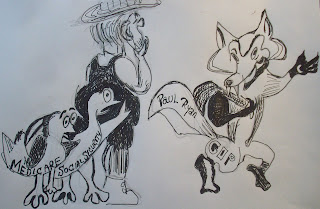Top: General Ambrose Burnside; Bottom: General Benjamin Butler
During the Civil War, the Southern insurgents who began with war with not a single cannon factory, with a huge disadvantage in terms of population, economy and political organization (no central government) managed to fight the North to near defeat because they had one form of central government which mattered, an army, and they had excellent generals.
The North had some pretty terrible generals. Some, like Ben Butler were well connected politically, and really incompetent and some, like Ambrose Burnside, were simply incompetent. But they did things like sending their troops across a long field in long lines of marching bodies only to have them mowed down because the enemy now had rifles instead of muskets. In the days of muskets, long lines of infantry marching upright worked pretty well because you could not shoot accurately from half a mile away and you could not reload many times. Rifled barrels changed all that, but the generals either did not realize this or they realized this but were not flexible enough to change tactics. Something similar occurred in trench warfare in World War I, when lines of troops were sent running across fields raked by a new weapon, the machine gun.
In hospitals, the generals, i.e. the chiefs of service, kept on call schedules for interns at the thirty six hours on call rather than instituting a night coverage system whereby interns handed off the baton at night and went home and got some sleep. The chiefs argued this was good for the interns, because they could see a patient from his admission, through his "crisis" and could appreciate the full course of an acute illness. This may have been true when the chiefs were training, because there was relatively little for interns to do during lose long nights on call. But by the time the chiefs had become chiefs, the patients were sicker and there was more to do at night.
When the chiefs were interns and a patient went into cardiac arrest, they sent that patient to the morgue and the interns could go back to bed. When electrical defibrillators and a new generation of medications arrived, patients going into cardiac arrest became a new demand for interns' time and energy. Ditto for patients who went into gram negative sepsis.
Charles Christian, who was chief of medicine at Cornell once stunned a group of medical residents by saying it was much easier to be on call in the "days of the giants" when interns were on call every other night, because they slept through the nights most nights and there was so much less the interns could actually do for patients. His generation of doctors had always bludgeoned the current generation who complained about the sleep deprivation and the difficulty of surviving the on call schedule with comments like, "You guys have it easy, every third night on call. We were on every other night." So don't be so faint hearted, you wimps. This was a revelation.
Eventually, the system changed and interns were sent home to get some sleep and the number of hours they worked consecutively were limited. And guess what? The interns still got trained as doctors.
So now, we are faced with choosing leaders again. And there are men and women who want to be leaders who do not understand the nitty gritty of what the troops on the front lines have to do and the difficulties they face. These leaders say we can do health care with coupons, and they say we can provide for retirement with the stock market and they say we do not need taxes--all we need is tax cuts. They say government is bad and what we need is less government and more private enterprise to solve the problem of a stalled economy, of business men who destroy banks and business. They say government regulation is the problem, not the solution.
If we make these people our leaders, our troops will suffer, and the people they serve will suffer. And by our troops, I mean everyone who works in the trenches, providing medical care, putting out fires, policing our towns, building bridges, paving roads.
In Hampton, the Smutty Nose brewery almost did not get built because there was no sewer hook up. All those jobs would have been lost, all the commerce down the drain because leaders were short sighted, not wanting to spend money to provide infrastructure to bring business to town.
Penny wise, pound foolish. That's the Republican-con. Bad leadership.















